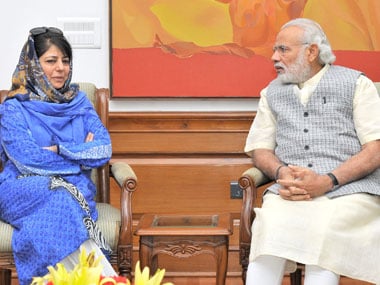Politics in India is going to pieces – literally. As political and social fragmentation leads to splintering of votes among parties, coalitions become inevitable, even if they look 'unholy' . But that isn’t unique to India. Europe is already notorious for coalitions of the weirdest kind. Only ten days after HD Kumaraswamy became Karnataka’s chief minister on 23 May, with just 36 seats in the Assembly of 224 members, Pedro Sánchez took oath as Spain’s prime minister with 84 seats in a Parliament of 350. A day before that spectacle in Spain, political novice Giuseppe Conte of Italy, who had allegedly lied about his educational qualifications, became his country’s prime minister because two coalition partners couldn’t find a better “compromise” candidate. [caption id=“attachment_2963642” align=“alignleft” width=“380”]  Outgoing Jammu and Kashmir chief minister Mehbooba Mufti and Prime Minister Narendra Modi. Image courtesy PIB[/caption] So, what’s special about India’s coalition politics? A do-or-die game of self-preservation by parties, perhaps? Even that isn’t an Indian copyright. But in India, it also comes with a good measure of puppet governors, rank opportunism, nexus with criminals, notes for votes, resort politics and a total lack of public accountability. All these horrors were brought in by Congress and are diligently followed by other parties as well. And Europe doesn’t have as many parties – leave alone regional parties – as India. A continent-sized nation, India has, besides the six national parties, 95 recognised and unrecognised state parties. According to one count, 138 state governments have been formed in India since 1977, and 40 of these were coalitions with an average life of not more than 26 months. For India’s national, as well as regional parties, a mad desire to win the next election by hook or crook, more by crook, is also a compelling factor that makes them dive in and out of alliances. 2019 beckons BJP, Congress Just around the time BJP ended its alliance with PDP on Tuesday, Kumaraswamy said in Bengaluru that he would present a “full budget” for 2018-19 but not a supplementary one. What both BJP in Jammu and Kashmir and JD (S) in Karnataka have in mind is the 2019 General election.
One of the reasons why BJP dumped PDP was that it didn’t want to be part of its partner’s ‘kid-gloves’ policy on terrorists. That wouldn’t hold BJP in good stead when it faces polls in 2019, would it?
Similarly, if Kumaraswamy wants to present a full budget, it’s because he wants to take credit for all the schemes that might be in it when he goes to voters in 2019. But never mind if Congress had already presented a budget for the year before the 12 May Assembly election. He doesn’t want to be seen as dusting off an old budget and make it look like a new one. He wants a really new one. And Congress, which wants its own budget to be implemented, insists that Kumaraswamy should only present a supplementary one. But Kumaraswamy has got the nod from Rahul Gandhi for what he wants to do. There are other alliances, of course. BJP has 15 chief ministers in India, and three of them — in Maharashtra, Goa and, to some extent, in Assam — need support from allies for survival. After the collapse of the Jammu and Kashmir alliance, there are only the governments in Bihar, Meghalaya and Nagaland which need BJP’s support for their continuation. The government in Karnataka must have the backing of Congress for its survival. From the point of view of the politics of existing coalitions, the key states to watch are Maharashtra, Bihar and Karnataka. If BJP has refused to succumb to the pressures of PDP in Kashmir, Congress has meekly surrendered to JD(S) in Karnataka. Congress commits harakiri? This capitulation by Congress president to the regional party is so complete that his local leaders say that, if this situation continues, the party will commit a political harakiri in 2019 and may not exist in Karnataka after that. It’s safe to presume that many Congress leaders will soon hatch plans to defeat their own alliance to retain their own strangleholds on their respective fiefdoms. From the Karnataka alliance, Gandhi may achieve the opposite of what he wants to. But JD (S) isn’t the first party to play this game. Nor will it be the last. Recent history is replete with such examples. Trinamool Congress is one such. The party had joined NDA during the 2004 elections, left the alliance in 2007, joined UPA and left that too in 2012, allegedly over economic issues. TMC chief Mamata Banerjee now says she is fighting BJP, deftly suggesting that if the prime minister’s post comes her way, she will not shirk the responsibility of saving India by accepting it. But, of course, saving West Bengal with her leadership takes precedence over saving the nation. Similar is the case of many parties including Telugu Desam, Telangana Rashtra Samithi and the two Dravidian parties in Tamil Nadu who drifted in and out of national alliances for their own regional considerations. National parties ditching regional partners to suit their Lok Sabha election plans is only the natural corollary of it. Rainbow coalitions On BJP dumping PDP, its chief pointsman for Kashmir Ram Madhav said: “… this was a historical alliance. We do not believe in political untouchability. Ideologies are black and white, but politics in democracy has many shades. It is multi-layered and multi-coloured. If you succeed in managing these colours, you can create a nice rainbow. Let me end the metaphor there because rainbows naturally have a very short life.” Like the many poets who waxed lyrical about “chasing rainbows”, India’s voters may have to go on watching the colourful clouds drift by and see their dreams end in the sky. Author tweets @sprasadindia


)
)
)
)
)
)
)
)
)



